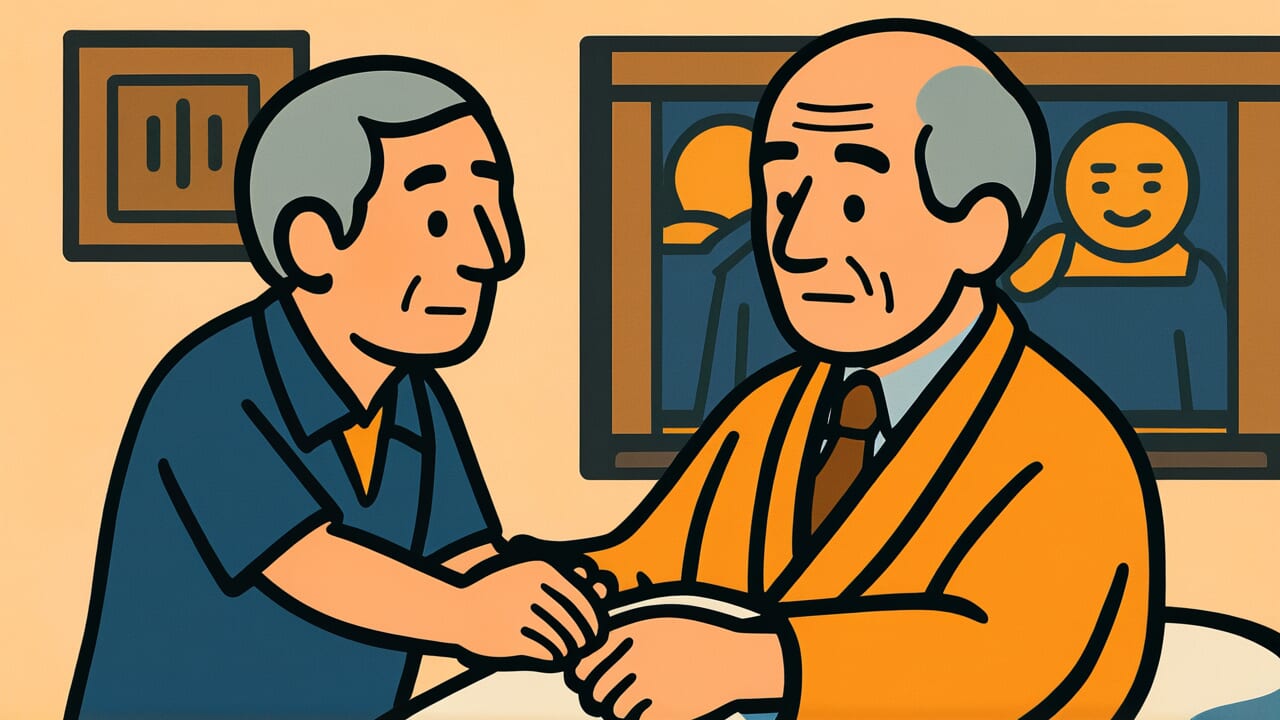How to Read “Treat the elderly as your father”
Oitaru wo chichi to seyo
Meaning of “Treat the elderly as your father”
This proverb teaches that we should respect and care for older people as we would our own father. It means showing the same respect and kindness to experienced elders that we show our father, regardless of blood relation.
People use this saying when teaching young people how to treat elders. It also comes up when discussing the spirit of respecting the elderly in society.
The proverb asks for more than just polite manners. It calls for the warm consideration and deep respect we naturally feel toward our father.
Today, nuclear families are common and chances to interact with elders have decreased. Yet this proverb still holds important meaning.
Respecting the experience and wisdom of older people builds bonds across generations. This attitude creates a foundation for rich human relationships.
Origin and Etymology
The exact source of this proverb is unclear. It likely emerged from a blend of Confucian ideas about filial piety from China and Japan’s spirit of respecting elders.
The expression “oitaru” means more than just someone who has aged. It carries respect for someone who has accumulated long life experience.
The phrase “chichi to seyo” (treat as father) delivers a strong teaching. It says we should respect and cherish older people who aren’t blood relatives just as we would our own father.
Confucianism considers filial piety one of the most important virtues. Respecting parents forms the foundation of human relationships in this philosophy.
This thinking came to Japan and expanded beyond parent-child relationships within families. It grew into respect for elders throughout society as a whole.
Many moral texts and instruction books from the Edo period discuss the importance of respecting elders. In village communities, the wisdom of experienced elders was essential for survival.
Against this social background, this proverb took root. It expressed the spirit of respecting elders beyond blood ties in simple, direct words.
Usage Examples
- Approaching elderly people in your community with the spirit of “Treat the elderly as your father” enriches the whole neighborhood
- If you respect senior colleagues at work with the attitude of “Treat the elderly as your father,” you will learn many valuable things
Universal Wisdom
The proverb “Treat the elderly as your father” contains deep wisdom about how human society sustains itself. Why have cultures throughout history and across the world developed traditions of respecting elders?
The answer lies in how humans fundamentally grow through accumulated experience. Most animals can live by instinct alone. But humans cannot survive without learning and experience.
Older people possess wisdom built over long lives. They hold lessons learned from failures and methods for overcoming difficulties. This is living wisdom that books cannot teach.
This proverb also prevents gaps between generations. If young people cut off elders as “people of the past,” society becomes divided.
But the expression “as your father” includes warmth and bonds like blood ties. When we think of our actual father, we feel more than just respect.
We also feel love, gratitude, and sometimes worry. These emotions create genuine connection.
Humans cannot live alone. We exist through mutual support across generations. This proverb expresses this essential human reality in simple words.
Respecting elders actually means caring for your own future. Why? Because someday we will all grow old and become people the next generation respects.
When AI Hears This
Communication systems deliberately send the same information multiple times when transmitting important data. This is called redundancy.
For example, satellite signals layer the same information many times over. This allows recovery even if noise corrupts part of the signal. Valuing elderly people in human society serves exactly this redundancy function.
Consider a group of only young people. They have high processing power for current information. But they don’t know how to handle rare disasters or crises from the past. Their database has gaps.
When elderly people are present, memories of the great flood 50 years ago or the famine 30 years ago are preserved. These are redundant copies of survival-critical information about low-frequency events.
Even more interesting is that information held by elders isn’t just a copy. It also has error correction functions.
When young generations are about to fail at new attempts, elders can issue warnings based on similar past patterns. This corresponds to “parity checking” in communication engineering.
Having multiple generations in a group increases the probability of detecting and correcting wrong judgments.
In information theory, system reliability is proportional to redundancy. Multi-generational society is an extremely efficient design for the human information processing system to withstand long-term environmental changes.
Lessons for Today
This proverb teaches modern people that truly important learning comes from relationships with those who have lived longer than us.
In modern society, information is easily available on the internet. But search engines cannot answer life’s essential questions.
How should I live? How do I face difficulties? How should I treat people? For these questions, the older people around you are living textbooks.
What matters is not just “respecting” older people. It’s engaging with them with the familiarity and trust you would show your father.
Not formal courtesy, but genuine interest. Listen to their stories and try to learn from their experience. This attitude enriches your own life.
Senior colleagues at work, elderly people in your community, older family members. Casual conversations with them hide hints for enriching your life.
When you learn from elders now, you’re also building something important for the future. You’re creating a society where the next generation will warmly welcome you when you grow old.



Comments